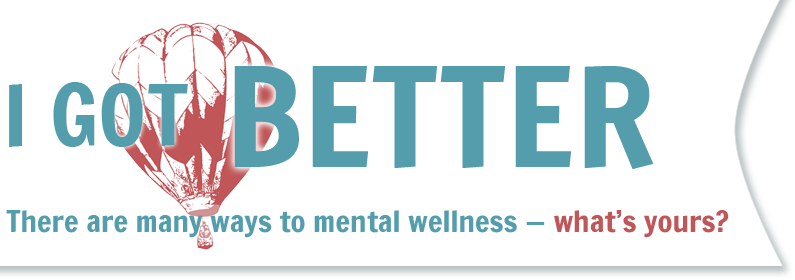I Got Better and Recovered From Psychiatric Abuse
Melinda James

Psychiatrists’ diagnoses are not always correct. Labeling people as schizophrenic is a serious business, especially if they are not mentally ill, much less schizophrenic.
I was labeled as depressed after breaking up with my first boyfriend when I was 17 years old. I had been diagnosed by blood tests with epstein-barr virus (mono) and was sad about the breakup. Back in 1965, they did not have any treatment for mono, and I was very sleepy and tired. My abusive and controlling mother decided that because I was crying over the breakup with my boyfriend and because I was sleeping so much, and because I had talked back to her on a few occasions, that I must be crazy. She took me to a psychiatrist and I was diagnosed with a depression.
No talk therapy was ever suggested; this doctor was of the drugs and shock school. So I was shocked the entire summer before I left for college. My parents were extremely unhappy and on the verge of a divorce, and after 16 shock treatments during the summer of 1965, I was traumatized by the invasiveness of the procedure, and by the huge amounts of thorazine, stellazine, compazine, and a couple of other drugs I had been ordered to take.
I left for college in Michigan, and saw the psychiatrist there that the Alabama psychiatrist had recommended I see. This fellow said I did not need to be taking the drugs, and also that I certainly did not need shock treatments. I was afraid to see him more than a few times because I thought he might change his mind and decide to shock me, however. I had recurring nightmares about the shock treatments and developed extreme fear of going to sleep because I would wake up screaming, seeing the doctor bending over me (in the dream) with the electrodes.
One treatment during that first summer had gone awry and I had not had enough anaesthesia, but I was paralyzed by the muscle paralyzing drug they give you to keep you from breaking bones during the seizure and had no way to tell them I was still conscious — I could not even blink my eyes. Being shocked that time felt like someone had bashed my head with a hammer.
At college that fall, I became homesick (had never been away from home that long before) and called my mother several times for reassurance, but she became angry whenever I called and told me not to call, to put it in a letter. I went home for Christmas break and then back to Michigan. There was deferred sorority rush, and I dutifully went through it, since I wanted to please my mother. At one of the rush parties, I looked back at the girl who had just introduced me to another couple of girls and saw that she was rolling her eyes and making a face to another of her sorority sisters. I thought this was some kind of negative comment on me, since I had gained a lot of weight from the thorazine and other drugs, and because I had a southern accent. It hurt my feelings, and after the party, I went upstairs and called my mother, crying. She said, ” Pack your bags and get home.”
I did this and went through the procedure for dropping out of school. This was much more serious than it is today. The dean of women made me sign something that said I would never try to attend the University of Michigan again, but I was not worried because I had good grades and good SAT scores, and I figured my parents would be thrilled that I wanted to transfer to the University of Texas, since they had wanted me to apply there in the first place. I called my mother and told her I had bought a ticket and would be home two days later.
When I got off the airplane, my dad met me at the gate and we went downstairs to the parking area. My mother was waiting in the car with the motor running, and my dad seemed a little strange to me. I got in the back seat, realizing that they had brought the volkswagen, with only two doors. As we drove off, I was looking forward to telling them the good news — that I wanted to transfer to the University of Texas. I thought we would go home like civilized people and have dinner while we discussed my situation. But I realized pretty soon that we were not going home. I remember saying over and over, ” Where are we going?” But they would not answer, and my mother kept determinedly driving. I realized that we must be going to a hospital, and I said, “Are we going to a hospital?” But neither of my parents answered.
I found out later that what happened to me was that I went into a state of shock, but at the time I did not know what that felt like. I was numb and could not speak very well. My muscles went sort of slack, and I had trouble getting out of the car. My mother took me to the admitting room, and the admitting nurse held out some form for me to sign. I could not make myself sign it, I put the pen down. Then my mother threatened me, saying, ” If you don’t sign it, I will.” I picked up the pen again, pushed down all my protest and forced myself to signed it. The nurse took me up to my room and I asked her, ” Is he going to shock me again?” And she said, “He’s very hard on those who have to have it twice.”
I was in the hospital 5 weeks (during Jan/Feb 1966). I kept telling the nurses and the shock doctors that I was not crazy, that I had called my parents and they had told me to come home. The doctors did not believe me about contacting my parents and their telling me to come home. I found out years later that my mother did not remember the phone call when she ordered me home. I think this may have been because she had been drinking the evening I called. I also begged them to stop shocking me. But of course this kind of protest only makes the situation worse. If you deny their diagnosis, that means you are crazy, so I finally stopped complaining as much as I could stop.
20 years later when I went to an attorney and secured the records from the hospital, I saw that when I began to deny that I was crazy, asked them to stop shocking me, told them I needed to talk to someone, and told them I thought the treatments were hurting me, the doctor changed the diagnosis to schizophrenia,I guess because I told him the treatments were hurting me and I stubbornly maintained that I was not crazy. There is even a term for it: “anosognosia,” when a mentally ill person does not believe they are mentally ill.
I had to interview the doctor right before I was released. He made it clear to me that he would not let me out if I did not agree with him that I should have known my parents would put me in the hospital if I came home from college. This felt like a huge betrayal of myself, but I knew I had to do it, so I did, and he let me out. I thought the shocks were over, but it turned out that he wanted to keep shocking me on “maintenance” treatments, and had enlisted my mother as his monitor of me.
I was so shocked and so drugged up that I slept a lot, and my mother did not like this. So I had to fight the drugs and pretend to be cheerful, because if I cried or became angry or tried to convince her that I did not need shock treatments, she reported this to the doctor by phone and I would sometimes get an extra shock. The doctor shocked me for another 3 years, and I became traumatized from having to go to the outpatient clinic, and lie down and let them hurt me over and over.
I had never had any kind of hallucination, never been psychotic in any way, and even upon receiving the records 20 years later with the help of an attorney, I never saw any kind of notation in the records that would indicate that I was schizophrenic. The diagnosis was made on the basis of the MMPI test, which even in 1965 was well known to be notoriously unreliable for teenagers. In the records the doctor stated that I was oriented in reality, knew where I was, had no plans for suicide, absolutely nothing to indicate any kind of psychosis. The report on the MMPI and other tests, states that the person administering the tests cannot be sure that I had any mental illness, but the data — my answers to the tests — “might suggest the possibility of depression or psychosis.”
During the shocks there were two times that I was in imminent physical danger from the treatment. I did not know about these until 20 years later when I got the records. One time my heart rate dropped to less than 40 beats a minute and they were on the brink of intervention, but it picked up again after 10 minutes. Another time they ordered some kind of respiratory drug STAT because I was having great trouble breathing.
After 3 more years of shocks, I was a pretty pathetic sight. I was enrolled in college, but I had trouble keeping up my grades because after a shock treatment I would forget what I had studied and did not do well on tests. Plus I knew what they were doing to me was wrong, but I could not get anyone to believe me. Finally, after I turned 21, my roommate’s fiance, who was studying to be a lawyer, looked up the legal situation, and told me they could not give me shocks any more on the strength of my signature at 18. (The laws in Alabama at that time recognized majority at 21 for medical decisions.)
I complained to my mother that they could not shock me anymore since I was now 21, and finally, my father took action. He was a professor in the medical school (not an MD himself, but a professor of biochemistry). He collected all the drugs the psychiatrist had me taking in a paper bag and took them to the man’s office, and confronted him about them. The doctor subjected me to one more treatment and then said I did not need any more. In the car driving away from the outpatient clinic, my father told me the doctor had said I did not need any more treatments. I was so groggy from the anaesthesia and the shock that I didn’t respond much, but what I thought was “Well, now that they have almost killed me, what does it matter anyway?”
The doctor did not give me any more shocks, but I was prescribed the drugs for 4 more years. I finished college and got a job far away from Alabama and moved. I found a psychologist who talked with me as a client for about 2 years. The psychologist also referred me to a psychiatrist who did tests (MMPI, TAT, Rorschach, etc) and told me I had never been psychotic, and had never needed shock treatments or any of the drugs. The psychiatrist helped me safely withdraw from all of the drugs, and by January of 1975 I was off all of them. But I had developed PTSD from the ordeal of all the shocks against my will. I woke up screaming with nightmares many nights, but gradually that faded. I still have nightmares occasionally, but they are less intense than before.
I met and married a loving man and we have been together 38 years. I went back to school and completed a master’s and a PhD and taught as a professor for 10 years, so I have been able to have a life after all. I got better because I did not give up on the idea that I had never been crazy, never been mentally ill. If I had ever accepted the diagnosis, I do not know what would have happened to me.
I found out from some friends who remained in Alabama that the doctor who shocked me had been fired from the hospital for indiscriminate use of electroshock in about 1973, and that there was an article in the paper that stated that the State Board of Medical examiners had disciplined him and put restrictions on his practice. I have not been able to find the article, but I am still looking for it. I wrote the State Board and inquired about the man, but they responded that there was no disciplinary action against him. (He is dead now – died in 2000.) I understand that back then disciplinary actions were often not reported and were sort of gentlemen’s agreements.
I got better because I was never mentally ill and I knew it and held on to that knowledge, in spite of the doctor and my parents who wanted me to believe I was. This story will probably not make the cut to be in your online publication, because I did not get better from mental illness; I got better and recovered from psychiatric abuse. I was never mentally ill.


